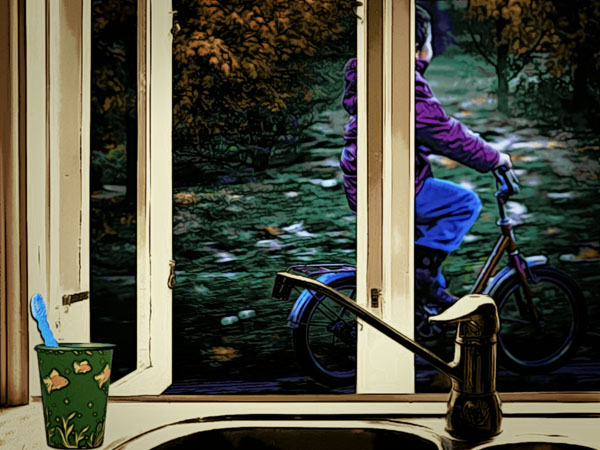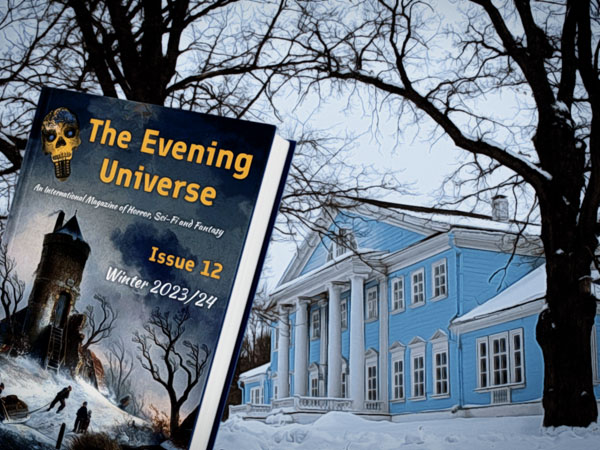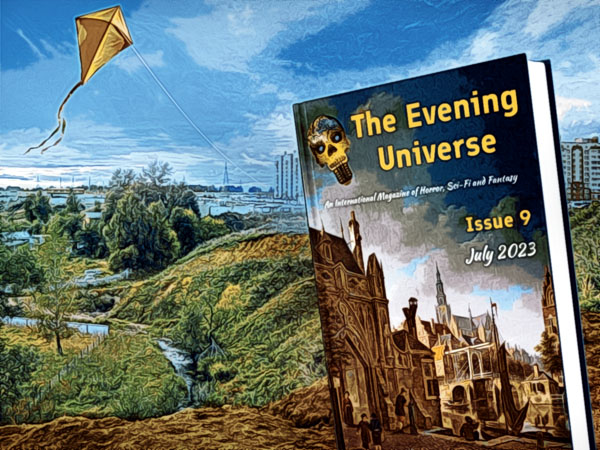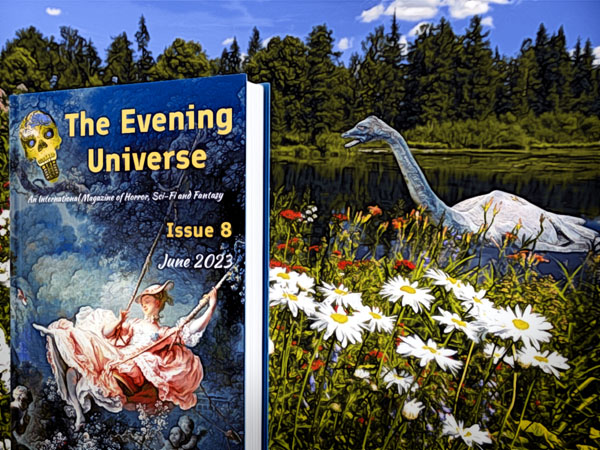
In the bathroom of the first party, the appetizer house, an orange candle burned on the windowsill, its weak flame struggling to survive. Lori, wine-buzz settling in, faced her blurry image in the mirror, eyes obscured by smeared black liner. A green plastic cup adorned with multicolored fish sat at the sink. A child’s toothbrush poked from the top, blue toothpaste sticking to its bristles. Lori clung to the sides of the sink and sobbed.
* * *
“I was looking all over for you,” Ted lied, as they exited. He clutched her arm in his usual caring/controlling way. “Where to next?” he asked, nodding at the other couples headed out to their dinner assignments.
“Evergreen. 271.” Lori closed her eyes for a minute. She enjoyed the slap of numbing air.
The neighborhood glowed, its sidewalk lined with beckoning luminaria. Jack-o-lanterns observed from their porch places, chuckling with toothless smiles.
“Jesus it’s cold,” Ted said through a clenched jaw, his breath hanging in a white puff. They trudged on in their standard tense silence.
“We’re here. Put your happy face on, dear,” he said, dropping her arm. They stood before an aged two story home.
How had she never noticed this house before, with its crooked shutters, peeling paint? It seemed like the only house in the entire neighborhood in disrepair, without decoration, with only broken pots, piles of wet, dead leaves, cracked steps leading to its front door.
“Just our luck,” Ted said, knocking.
A gust of wind blew through, leaves rustled in its wake. Lori turned. Off in the wide side yard, a lush green tree stood in a spot of moonlight, contrasting with the deadening October trees.
“Wait. What is—” she began to say when the door creaked open. A yellow light streamed from the house, enveloping them in its tarnished gleam. An older man with death-white skin stared solemnly at them.
“Have you come for supper?”
“Er…yeah. It’s a dinner party,” Ted said edgily. In an instant a younger woman with the same skin and dark clothes appeared, invited them in.
“Hattie Lane,” she said. “This is my father, Walter.”
Lori noted the mission style furniture and matching grandfather clock.
“This is lovely,” she said. “Just the way these houses are supposed to look.”
“Thank you,” Hattie said. “Come and sit in our living room.”
“Who else is coming?” Ted said.
“Others? Others are coming?” Walter looked with panicked eyes at his daughter.
“No, no, Daddy, just this nice couple, Lori and—” Hattie looked at Ted.
“Ted Gravely.”
Hattie drifted out of the room.
Lori enjoyed the ticking clock and the soft cushion against her back. She breathed in deeply, relaxed her shoulders. Was she a child again? Was she home in Ohio? She felt the soft length of a purring cat against her leg, reached down to stroke it, but her hand was only suspended in air, petting emptiness. Ted and Walter sat awkwardly facing one another.
“How long have you guys lived here?” Ted asked.
Hattie drifted back to the sitting room. She carried a tray holding a steaming pot and china cups.
Lori straightened up in her chair. “Tea’s just the thing on a cold night like this.”
“I’ll pass,” Ted crossed his legs. “How long did you say?”
“Say what?” Walter asked.
“How long have you lived here.”
“We’ve always lived here,” Hattie said, handing a floral china cup to Lori, “I was born in
this house.”
At that, Walter’s face changed and he became agitated.
“Agnes!” he whispered urgently, clenching his right fist in his lap. Ted’s knee bounced in discomfort.
“Mommy is still at the nursing home. We expect her to come home soon though. Daddy is anxious.”
Hattie invited them into the dining room. The table was laid with white china plates laced with gold leaves and fall flowers. Silver serving bowls and platters carried roast chicken, vegetables, and potatoes. Lori spooned gravy over her dinner and tucked in, eating until she found a perfect fullness. Ted’s eyes glistened, glazed with gluttonous joy.
“Now, before we have dessert,” Hattie said, “do you think your son would like to join us?”
“Our son—” Ted began.
“Our Robby—died—leukemia—last year,” Lori said matter-of-factly, feeling a rush of relief.
“Would he like to ride his bike along our dark aisle?” Walter said.
“Yes, we’d love to have him here, if you’ll allow him to join us. And you can come too, when you’re ready,” Hattie said. She reached a cold hand across the table to touch Lori’s.
“Isn’t it too—” Lori was going to say too cold, or was she going to say too late?
“We need to head to the dessert house. Now,” Ted said, pushing his chair out to stand. “That was delicious and all, but—”
Lori turned back to say thank you and goodbye one last time.
“Goodbye! Goodbye!” Hattie and Walter waved as the door closed behind Lori and Ted. The lights blinked out. The broken shutters clanked in the autumn wind.
* * *
“I need a drink after that—” Ted said, rushing into the dessert house. Lori followed him inside, where once again the neighborhood crowd gathered, louder, drunker than before.
“Where were you two? You were assigned to our house for the dinner,” Sally Slocum scolded. Ted rushed to the bar; a circle of men opened to receive him.
At the window, Lori pressed her forehead to the cold panes. How nice it must be, to live somewhere so long—like Hattie and Walter-to live with your mother’s plates and recipes. How comforting, knowing for sure she will come back, soon.
The fleeting shadow of a moving bicycle cruised by in the darkness. Lori watched as long as she could, then moved toward the door.
She left quietly, without saying goodbye.












